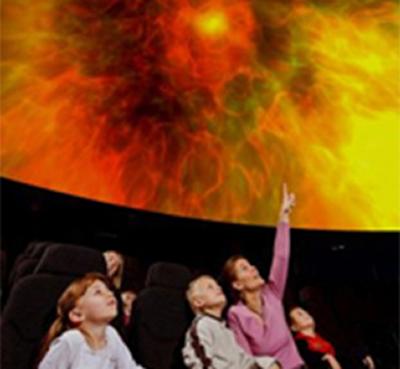The sounds of Mars and Venus are revealed for the first time

In a world first, the sounds of Mars and Venus are revealed as part of a planetarium show in Hampshire this Easter. Despite many years of space exploration, we have no evidence of the sound of other planets. While most planetary probes have focused on imaging with cameras and radar and a couple have carried microphones, none of them successfully listened to the sound of another world.
Now, a team from the University of Southampton, led by Professor Tim Leighton, has the answer. Using the tools and techniques of physics and mathematics, they created the natural sounds of other worlds, from lightning on Venus to whirlwinds on Mars and ice volcanoes on Saturn’s moon, Titan. In addition to these natural sounds, they have modelled the effects of different atmospheres, pressures and temperatures on the human voice on Mars, Venus and Titan (Saturn’s largest moon). They have developed unique software to transform the sound of a voice on earth to one that’s literally ‘out of this world’.
Professor Leighton, of the University's Institute for Sound and Vibration Research, says: “We are confident of our calculations; we have been rigorous in our use of physics taking into account atmospheres, pressure and fluid dynamics.
“On Venus, the pitch of your voice would become much deeper. That is because the planet’s dense atmosphere means that the vocal cords vibrate more slowly through this ‘gassy soup’. However, the speed of sound in the atmosphere on Venus is much faster than it is on Earth, and this tricks the way our brain interprets the size of a speaker (presumably an evolutionary trait that allowed our ancestors to work out whether an animal call in the night was something that was small enough to eat or so big as to be dangerous). When we hear a voice from Venus, we think the speaker is small, but with a deep bass voice. On Venus, humans sound like bass Smurfs.”
These sounds will be added to the ‘Flight Through the Universe’ shows this Easter at the Astrium Planetarium at INTECH near Winchester; it is thought to be a world first. Show dates are 4, 5, 11 and 13 April, with shows at 12:30pm and 3:20pm.
Professor Leighton adds: “At present, planetariums show great images but there is no real extra-terrestrial sound to accompany them. Some use classical music or make up sound. This is the real deal – it’s as close as we can get to the real sound of another world until a future probe or astronaut actually goes there and listens to what it really sounds like.”
Dr Jenny Shipway, Planetarium Manager at INTECH who will present the show, says: “This is an amazing opportunity to add another layer of realism to our shows. Hearing the sounds communicates ideas about the different atmospheres and highlights the sheer alienness of the other worlds in our solar system. There is interest in this software from other planetariums worldwide, and we’re very proud to be hosting this world first.”
Professor Leighton, along with his colleague Professor Paul White, hit the headlines in 2004 when they speculated that the Cassini-Huygens probe to Titan may land splashdown on a methane/ethane lake, at a time when the very existence of such lakes was conjecture. They also calculated what a ‘waterfall’ of methane would sound like and produced the sound electronically.
Now, MSc students Nikhil Banda and Benoit Berges have worked with Professors Leighton and White to extend the science to the atmospheres of Mars and Venus. They have also come up with the sounds of thunder on Mars, Venus and Titan and duststorms on Mars and very cold cryo-volcanoes on Titan. Over the last few years, Professor Leighton has also worked with of Dr Andi Petculescu at the University of Louisiana in Lafayette, and together they have rigorously examined how voices and musical instruments would sound on other worlds.
Professor Leighton, who has been working on the sounds of space for the last ten years, adds: “I’m interested in what music would sound like in space. If astronauts are based on Mars for several months, they might just take musical instruments along, or build one there. What would they sound like?
“As a scientist, I reckon the most exciting thing to work on is a completely new idea, something that’s never been done before.”